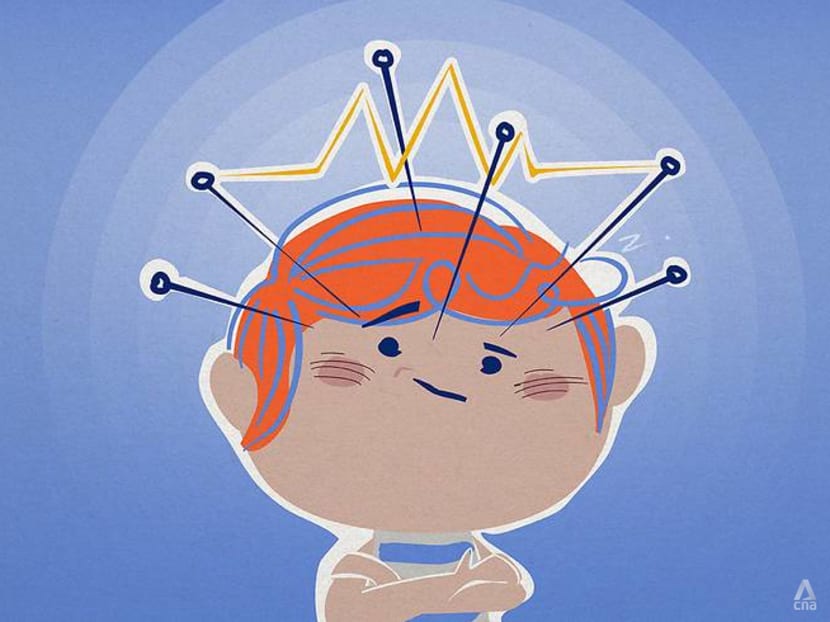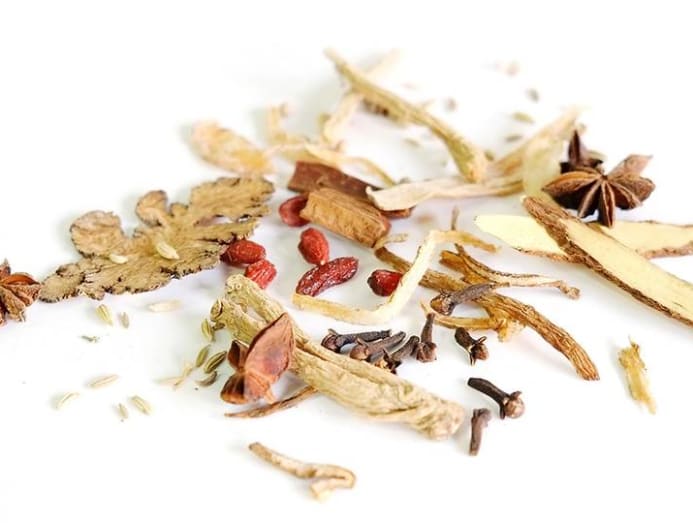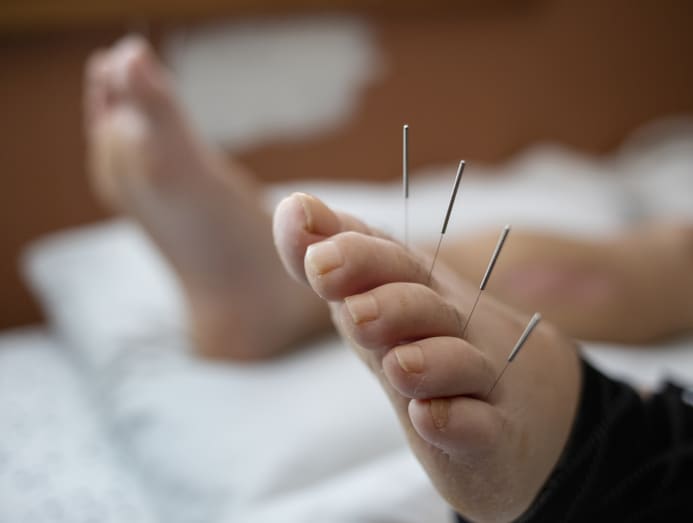TCM for kids? Some parents are taking an alternative approach to paediatric wellness
To boost immune systems, some parents have started planning stops at the TCM clinic before dropping the kids off at the daycare centre.

(Art: Chern Ling)
For some parents, helping their children recover from coughs and colds means taking them for paediatric tuina by the sinseh.
Chen Yingqing, who has been doing that for her five-year-old son since he was two, is one of them.
“He used to have the occasional cough or cold, and would get irritated by the coughing and runny nose,” said the 34-year-old teacher. “He also couldn't sleep well at night and would get cranky at times.”
Chen decided to give traditional Chinese medicine (TCM) a go after her son’s phlegm and coughing persisted after being on conventional medicine for a week; a colleague had suggested she try a TCM clinic.
“My son was given paediatric tuina, herbal medicine for consuming and a small medicinal pouch to place on his navel when sleeping,” she said.
“We had to visit the clinic for three days in a row and it was quite inconvenient because it isn’t near where we live.
"But after that, his phlegm started to lessen and he also coughed less.”
WHEN YOUR CHILD KEEPS FALLING SICK
In TCM, health issues are believed to be caused by an imbalance of yin and yang elements in the body, said Anita Pee, a physician from Eu Yan Sang TCM Clinic @ Clementi Mall.
“When the yin and yang in our body are not in balance, and our organ functions are weak, the qi (or energy) in our body cannot protect us from pathogens and we will easily fall sick,” she said.
Kids have another thing going against them though. “As children are still developing, their body functions have yet to fully mature and this makes them more prone to illnesses,” said Pee.
Kids are particularly susceptible to respiratory and digestive problems because their “lungs and spleen systems tend to be weak.”

As a result, children may have recurring coughs or persistent phlegm after a bout of flu, said Teo Pei Si, a TCM physician with Raffles Chinese Medicine.
“Some parents turn to TCM treatments because they are not comfortable giving their children conventional medicines whenever they catch a cold, which could be as often as once a month,” said Teo.
READ: Tips on how to raise your children to be vegetable eaters
Sometimes, it may be symptoms such as poor appetite and fitful sleep that parents don’t think warrant a visit to the doctor’s.
But these issues may reflect underlying problems in the body that could affect a child’s development if left untreated, said Pee.
“TCM addresses these issues and the child’s overall health to improve his health and immunity,” she said.
TCM FOR KIDS
Herbs play a big role in TCM. For instance, codonopsis root and Chinese yam can strengthen the spleen, which, in its weakened state, is usually thought to be the cause of a child’s poor appetite and lethargy.
Meanwhile, fitful sleep is often attributed to heat in the liver and heart meridians in TCM, said Pee. Herbs such as gambir vine and poria can reduce liver heat and calm the mind.
However, it is important to see a licenced TCM practitioner and not head to the Chinese medicine hall to concoct your own mix of herbs.
How are these herbs usually taken? Bitter brews often come to mind when most people think about TCM remedies – not the most child-friendly methods around for sure.
So, to convince Junior to take his medicine, small amounts of herbal powders may be prescribed instead, said Teo.
“They can be given using a feeding syringe to reduce contact with the child’s tongue,” said Teo.
To further cajole fussy young patients to take their medicine, she suggested adding a small amount of honey to the powder to improve the taste.
“Certain powders can be administered transdermally through the feet or belly button,” she said.
Other than herbal powders, TCM physicians may also use tuina on your child.
“Paediatric tuina uses massage, acupressure, and body manipulation to stimulate specific acupoints or areas for treating and preventing diseases in children,” said Pee.
“It is most effective for children under the age of seven.”
Teo agreed that paediatric acupressure is “hardly effective for older children as its effectiveness declines”.
But it is optimal for infants and pre-schoolers as the physician will “adjust the techniques and strength accordingly”, she said.
However, young patients with burns, skin problems, infectious diseases, fractures or tumours are not suitable for paediatric acupressure as it may aggravate their existing conditions.
Children’s acupressure points and areas are also different from those of an adult’s.
Kids have a special set of acupoints on their hands and fingers that are linked to different organs in the body, said Pee, which is why paediatric tuina often focuses on the child’s hands.
“Paediatric tuina is done using quick, light and gentle strokes while making sure the child is comfortable,” she said.
READ: If your child has the flu, it might be better to ride it out instead of giving medication
In the case of a cold, your child may be massaged on the head, with an emphasis on his nose if he has a runny or blocked nose, said Pee.
“Next, his hand may be massaged to clear the lungs and dissolve phlegm, and to dispel the heatiness in the body. Then, his chest will be massaged to soothe the lungs.
"There are also some areas on the back that serve to clear and strengthen the lungs, which will help with recovery.”

The massages can also be done at home by parents.
Chen, who has been using the techniques she had learnt at a workshop on her son and three-year-old twin boys, said the massages create a “good bonding” session with her children.
“My kids enjoy the tuina and it also soothes them to sleep at night,” she said.
As for acupuncture using needles, it is not entirely unheard of for children. But it isn’t suitable for active children who are unable to sit still, said Teo.
“The treatment requires acupuncture needles to remain in the body for a certain amount of time.”
TCM BEFORE DAYCARE AND HOLIDAYS
First to the TCM clinic, then to the childcare centre? That’s the move that some parents have adopted to protect their children against the bugs they might pick up from the other kids, said Teo.
“We see such cases throughout the year as some parents anticipate a need to improve their children's immune system.
"There is also a rise in these cases during school holidays when their children would have more time to commit to the treatment programme,” she said.
Naturally, the period before the school holidays often sees a peak in young patients at TCM clinics.
Said Pee: “I see more cases before families go on holidays. It’s to either help the children get well quickly so that they can go on their trip, or to strengthen their bodies so that they won’t fall sick easily while overseas.”
To bolster young immune systems, Teo said that TCM usually has a two-phase approach.
During the treatment phase, the patient will be reviewed on a weekly basis to treat remaining symptoms from a recent flu episode.
“Once the symptoms are cleared, the reinforcement phase would serve to prevent the patient from falling sick,” she said, adding that this may require a review every few weeks.
“The entire treatment duration usually takes a few months, depending on the type of treatment administered and the patient's response to the treatment,” said Teo.





